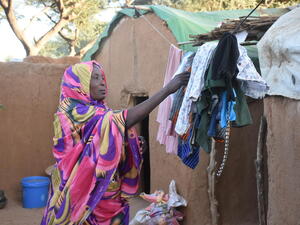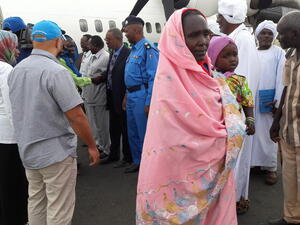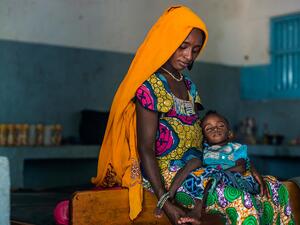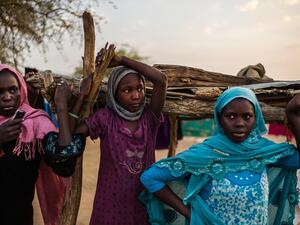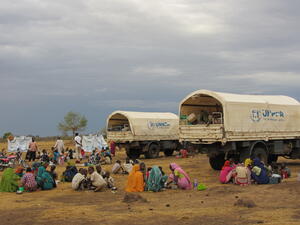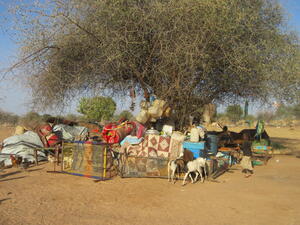UNHCR launches appeal for internally displaced Sudanese and Chadian refugees in West Darfur
UNHCR launches appeal for internally displaced Sudanese and Chadian refugees in West Darfur
UNHCR is launching a $US 19.7 million appeal to fund our protection and assistance activities in 2007 for tens of thousands of internally displaced Sudanese as well as Chadian refugees in West Darfur.
The appeal notes that despite the signing of the Darfur Peace Agreement (DPA) in May 2006 and UN Security Council Resolution 1706 in August, the security situation in the region remains extremely volatile.
With constant fighting between government troops and rebels opposed to the DPA, as well as regular attacks by Arab militia on African tribes, there is no prospect of return for internally displaced people in Darfur, nor for the more than 200,000 Sudanese refugees hosted in eastern Chad. There are presently an estimated 2 million displaced persons in north, south and west Darfur, including 250,000 who have fled fighting in the past six months. In West Darfur alone, where UNHCR's teams are mainly based, there are an estimated 700,000 displaced.
There are also 20,000 Chadian refugees who have fled to Darfur following insecurity in border areas of their homeland over the past year. Eastern Chad hosts 230,000 Sudanese refugees from Darfur in 12 UNHCR camps. They fled Arab militia raids as well as fighting between governmental forces and rebel forces in 2003 and 2004.
The appeal notes that the region is characterised by a continuing state of emergency. The ongoing conflict and prevailing insecurity in Darfur are the main challenges for internally displaced persons and refugees as well as for all humanitarian actors. Aid workers have been the targets of organized attacks. In the past months, 12 of them have been killed in Darfur. Humanitarian compounds and possessions have also been targeted. As a result, attacks or fear of attacks seriously reduces access for aid workers to the people the most in need.
Despite the extremely precarious security conditions in Darfur, UNHCR remains committed to assisting the displaced and refugees in the region. In 2006, UNHCR conducted regular protection monitoring missions in those villages where access was possible. Our teams have also been directly involved in the prevention of and response to sexual and gender-based violence, especially through 34 UNHCR centres for women. The centres are located in IDP camps. The centres have so far helped 80,000 women to improve their living conditions through vocational training, income-generation projects and health education.
UNHCR has also provided legal aid to several hundred individuals who required representation and counselling. We also rehabilitated or built schools, sanitation facilities, water systems and shelter. In 2007, UNHCR plans to continue all of these crucial activities for internally displaced people.
The appeal also notes that in 2006, UNHCR established two refugee camps in West Darfur to assist some of the 20,000 Chadian refugees who fled insecurity in their country. Um Shalaya camp, near Mornei, hosts 3,800 Chadian refugees who were transferred from the border, while the camp in Mukjar accommodates 200 refugees. Thousands of Chadians decided to remain at the border, within a close range of their farms and families in eastern Chad. We will continue to ensure international protection and to provide assistance to the Chadian refugees in Darfur.
Insecurity in neighbouring Chad also pushed some 15,000 Sudanese refugees to come back to Darfur in 2005-06. Our teams will assist them in order to ensure their return is sustainable.
UNHCR is present in five locations in West Darfur: El Geneina, Zalingei, Mukjar, Habilla and Mornei. We also have an office in Nyala, in south Darfur. In total, we have more than 100 staff working in Darfur.
In Chad, meanwhile, UNHCR and its NGO partner MSF-Holland on Sunday completed an emergency distribution of relief supplies to more than 11,000 Chadians displaced in recent weeks by inter-communal violence in the south-eastern region. A total of 11,831 people received plastic sheeting, blankets, jerry cans and mats. These Chadian displaced people are located in and around the village of Gasire, several kilometres north of Goz Beida, the main town in south-eastern Chad.
Most of these people fled with nothing when some 25 villages were burned to the ground by armed Arab militia at the end of last year. Others fled anticipating violence in their villages. Sunday's distribution was made possible in large part by a major contribution from the US Office of Foreign Disaster Assistance (OFDA) that was delivered directly by aircraft to Abéché, the main town in eastern Chad, last Saturday. The distribution was done in parallel with a food distribution by the World Food Programme and partners.
The situation throughout south-eastern Chad remains precarious, and we continue to be deeply concerned over long-term stability in the region. Chadians still live in daily fear of attacks, and some who had returned to their villages following pledges of increased security have reportedly returned to IDP sites because of continuing violence.
In addition, the region has a very fragile environment with scare natural resources - particularly water and firewood. The additional pressure caused by tens of thousands of additional people fleeing insecurity poses a very real risk of depleting those resources.
More than 100,000 Chadians remain internally displaced in south-eastern Chad due to the unrelenting inter-communal violence. In addition to 230,000 refugees in UNHCR's 12 camps in the east of Chad, there are also 46,000 refugees from the Central African Republic in the south of the country.

